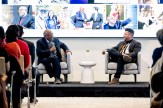Q&A: Michael Dukakis on Ted Kennedy
In 1962, Edward M. Kennedy won a U.S. Senate seat in Massachusetts in his first try at elective office. That same year, a young Harvard Law graduate from Brookline, Mass., named Michael Dukakis ran for and won a seat in the state legislature. During the ensuing 47 years, the two men shared a progressive ideology, a lengthy history of political triumphs and travails, and a personal friendship. Now a Distinguished Professor of Political Science at Northeastern, Dukakis talked yesterday about his relationship with the late senator and the impact of his passing on the current national debate over universal health care, the passion of Kennedy’s political career.
How would you sum up Ted Kennedy as a politician?
He was the whole package for me, a remarkable combination of personal commitment and passion for the job, and skills, legislative ability. He never would start a policy initiative without getting a Republican cosponsor.
You know, after Bill Clinton went down to defeat on his 1993 health care plan, he and Ted got together to see what could be done, and decided, OK we’ll start with the kids, so they came up with this children’s health plan. And Kennedy, as you might guess, was the principal cosponsor in the Senate.
[Republican Senate Majority Leader] Trent Lott knew that Kennedy was looking for a Republican cosponsor. Kennedy had this long-standing personal friendship with [Utah Republican] Orrin Hatch, and when Lott found out that Hatch had agreed to cosponsor the bill, he was just furious. But they put it through—raised the federal cigarette tax from 24 cents to 67 cents and put it through. That was Kennedy.
Do you remember the first time you worked with him politically?
I’m sure we probably did some things together in the Sixties. But people ask me, “What are your favorite Kennedy stories?” and I’ve got two.
I was first elected governor in ’74, I was defeated by Ed King in ’78, so there was the great rematch in 1982, in the Democratic primary. King was the incumbent Democratic governor, albeit a conservative one; he later switched parties. Still, there was no reason for Teddy to come out 10 days before that election and endorse my candidacy, but he did.
Did you ever ask him about it?
He just thought it was the right thing to do, very similar to when he endorsed Obama in 2008. He was close to the Clintons, and I know they were very hurt and disappointed, but he did it anyway. And I know his endorsement was just as crucial for Obama then as it was for me in 1982.
My other favorite memory came about when I signed the universal health care bill in 1988. I’ll never forget when Teddy called me, he was just so proud—of me, of Secretary of Health and Human Services Phil Johnston, of the state. He was incredibly proud that his state was the first in the nation to enact universal health care.
You served as governor for 12 years while Ted was in the Senate, so the two of you must have worked together a lot. Does anything in particular come to mind?
On public transportation, which I’m slightly obsessive about, he was absolutely terrific. This was in my first term, and at the time, you could not bust the highway trust fund, the gasoline tax, you could not use it for public transportation.
I was one of the leaders to fight the so-called Master Highway Plan, which would have … created a California-style freeway system, eight lanes of elevated highway going right through Frederick Law Olmsted’s Emerald Necklace, down Ruggles Street and three feet from the Museum of Fine Arts.
And meanwhile, the “T” was just a basket case, it was awful, it would break down three days out of five when I took it to work.
So after a 10-year debate, we had killed the Master Highway Plan, and we had given up hundreds of million of dollars in federal highway money, but we thought, why can’t we use that for public transportation?
And Ted and [former House Speaker Thomas P. “Tip” O’Neill Jr.] were largely responsible for making it possible for Massachusetts to become the first state in the nation to be able to use federal highway money for public transportation.
We ended up with $3 billion to invest in the “T.” We acquired the entire commuter rail system in eastern Massachusetts for $35 million, stations, parking lots, tracks, … and we could not have done it without Kennedy and Tip’s leadership.
What will Ted Kennedy’s legacy be—what do you think he’ll stand out for above all?
In a general way, that he was somebody who knew where he stood, and he lived it, practiced it, did it. He had a very strong philosophy, which at times was not in vogue. And yet he never wavered at all. I think subsequent events demonstrated clearly that his values and his approach to public service made a lot more sense than some of the folks who were critical of him.
The one piece he wasn’t able to achieve was his goal of health care for everyone, and I hope we’re going to do that.
You see people at [health care] rallies holding signs, saying “Do It 4 Teddy.” How do you think his passing will change the health care debate?
No question we’d be on our way to a health care bill if Ted Kennedy had been healthy, engaged, and involved. If, for example, there had to be some compromising on a pure public option, because it was Kennedy, the liberal community would accept it because his credentials there were so strong.
I’m not saying we can’t get a health care bill, but there is no one with the unique set of skills and the respect that he had.
My own view is that the Democrats will have 60 votes for cloture, assuming Massachusetts changes the law and gets someone down there to vote. So what the Democrats have to do—not that you don’t keep reaching out to Republicans—is to put together a bill that has solid Democratic support, and then you use the 60 votes to close out debate.
But there is going to be some very hard work to do among Senate Democrats. Kennedy certainly would have been the glue to hold them together and get this thing passed. Now, other people will have to step up to try to do it.





